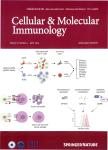Identification of novel HLA-A 0201-restricted epitopes from anterior gradient-2 as a tumor-associated antigen against colorectal cancer
Identification of novel HLA-A 0201-restricted epitopes from anterior gradient-2 as a tumor-associated antigen against colorectal cancer作者机构:Research Center for Cancer Immunotherapy Chonnam National University Hwasun Hospital Hwasun Jeollanamdo Korea Department of Hematology-Oncology Chonnam National University Gwangju Korea VaxcelI-Bio Therapeutics Hwasun Jeollanamdo Korea Samsung Medical Center Sungkyunkwan University School of Medicine Seoul Korea Korea Research Institute of Bioscience and Biotechnology (KRIBB) Daejeon Korea The Brain Korea 21 Project Center for Biomedical Human Resources at Chonnam National University Gwangiu Korea
出 版 物:《Cellular & Molecular Immunology》 (中国免疫学杂志(英文版))
年 卷 期:2012年第9卷第2期
页 面:175-183页
核心收录:
学科分类:0710[理学-生物学] 07[理学] 09[农学] 071007[理学-遗传学] 0901[农学-作物学] 090102[农学-作物遗传育种]
基 金:supported by a grant of the Korea Healthcare technology R&D Project Ministry of Health & Welfare by General Researcher Program Type II of the National Research Foundation of Korea from the Regional Technology Innovation Program of the Ministry of Commerce, Industry and Energy from the Regional Industrial Technology Development program of the Ministry of Knowledge and Economy from the National R&D Program for Cancer Control, Ministry for Health and Welfare from Leading Foreign Research Institute Recruitment Program through the National Research Foundation of Korea (NRF) funded by the Ministry of Education, Science and Technology (MEST), Korea
主 题:AGR2 colorectal cancer dendritic cell tumor-associated antigen
摘 要:Anterior gradient-2 (AGR2) promotes tumor growth, cell migration and cellular transformation and its enhanced expression is almost completely restricted to malignant tissues, thus making AGR2 an interesting target for the development of immunotherapeutic strategies. We investigated whether the AGR2 molecule comprises human leukocyte antigen (HLA)-A 0201-binding epitopes recognized by human cytotoxic T lymphocytes (CTLs), which could be targeted in dendritic cell (DC)-based cancer immunotherapy against colorectal cancer (CRC). We reviewed the sequence of AGR2 for peptides that could potentially bind to HLA-A 0201 with the aid of a computer-based program. Five candidate peptides with different binding scores were synthesized and tested. These peptides were then assessed for their immunogenicity to elicit specific immune responses mediated by CTLs in vitro by means of enzyme-linked immunospot assays and CTL assays. AGR2 was highly expressed in several CRC cell lines, including DK01, DLD1, KM 12C, HCT-8 and HT-29. DCs pulsed with AGR2-P2 (aa 11-19; LLVALSYTL) or AGR2-P4 (aa 127-135; RIMFVDPSL) generated potent CTLs that could lyse T2 cells pulsed with AGR2-P2 or AGR2-P4 and HLA-A0201+ AGR2-positive CRC cell lines in a strong dose-dependent and HLA-A 0201-restricted manner. In conclusion, these novel epitopes derived from AGR2 protein may be attractive candidates for DC-based immunotherapy for CRC.



